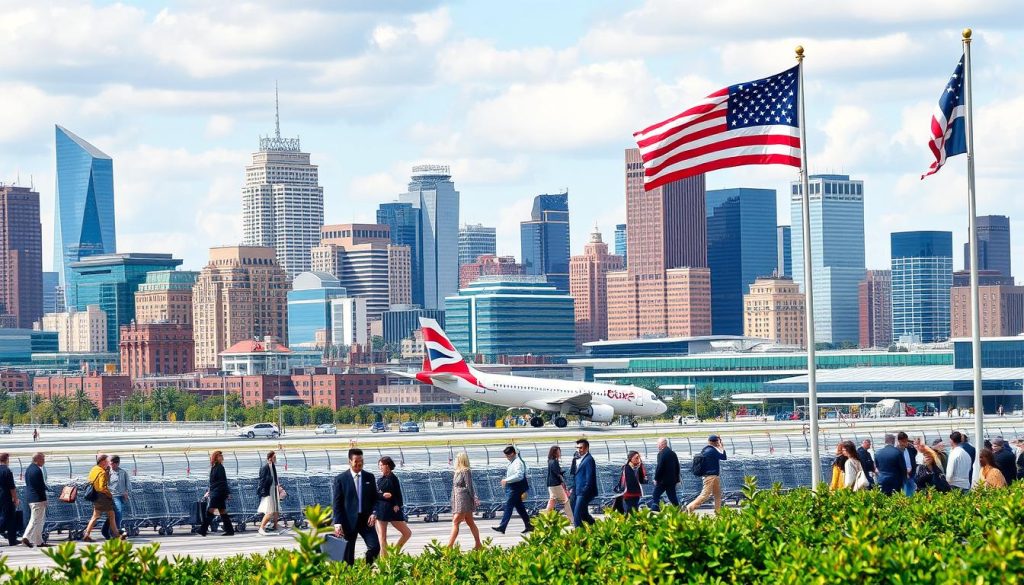The decision to relocate to America for business is a transformative journey, replete with both opportunities and challenges. As an expatriate, embarking on a career in the United States heralds a plethora of possibilities for professional advancement and success. This comprehensive guide is crafted to facilitate your navigation through the intricate terrain of international business relocation. It encompasses all facets, from visa necessities to assimilating into the American business ethos.
In this discourse, you will uncover critical insights into the relocation process. Topics such as financial planning, housing alternatives, and networking strategies will be explored, ensuring your readiness for an expatriate career transition. Irrespective of your reasons for undertaking this significant step, our objective is to equip you with the requisite knowledge for a seamless integration into your new professional sphere.
Understanding Business Migration to America
The process of migrating a business to America is replete with opportunities for professionals. It entails traversing a sophisticated framework aimed at enabling the establishment of a business entity or facilitating job transfers to the United States. The plethora of visa categories available necessitates a thorough comprehension of each option for a successful transition.
Key visas include:
- L-1 Intra-company Transfer Visa: Ideal for employees of multinational companies who wish to relocate to an American branch.
- E-2 Treaty Investor Visa: Suitable for individuals who wish to invest substantial capital in a U.S. business.
- H-1B Specialty Occupation Visa: Designed for skilled workers in specialty fields requiring theoretical or technical expertise.
Each category is accompanied by its own set of prerequisites and responsibilities, underscoring the importance of applicants’ thorough understanding of their specific circumstances. Utilising resources such as the U.S. Citizenship and Immigration Services (USCIS) will provide the most current information on eligibility criteria and application processes. This ensures a well-informed approach to progressing with the migration.

Reasons for Relocating to America for Business
The decision to relocate to America for business is driven by the country’s dynamic business environment, characterised by opportunities in emerging markets. Entrepreneurs and businesses seek new avenues for growth, and America provides a robust platform for innovation across various sectors. This environment is conducive to the expansion and diversification of enterprises.
Opportunities in Emerging Markets
Emerging markets within the USA offer a wealth of potential for companies aiming to expand their operations. Sectors such as technology, healthcare, and renewable energy are flourishing, attracting investment and talent from around the globe. Entrepreneurs can benefit from:
- Innovative ecosystems rooted in cities like Silicon Valley and Austin.
- Access to venture capital funding supporting start-ups and scale-ups.
- A highly skilled workforce eager to engage in groundbreaking projects.
The Economic Landscape of the USA
The economic landscape of the USA establishes it as an attractive destination for business relocators. Key indicators, such as sustainable GDP growth and low unemployment rates, create a stable environment for enterprises. Additionally, various regions across the nation exhibit strengths in diverse industries:
- Silicon Valley: Renowned for technological innovation and investment.
- New York City: A global financial hub with unparalleled market access.
- Seattle: Home to e-commerce giants and a thriving tech scene.
Familiarity with this economic landscape empowers business leaders to make informed decisions, paving the way for successful ventures and partnerships.

Navigating the Visa Process
The intricacies of the visa process are paramount when contemplating a business relocation to America. Acquiring the correct visa is crucial for the success of your venture, necessitating meticulous attention to detail.
Initially, comprehending the array of visas available is imperative. The specific visa category will depend on the nature of your business and your professional qualifications. Potential options include:
- Business Visitor Visa (B-1)
- Intra-company Transferee Visa (L-1)
- Investor Visa (E-2)
- Employment-based Visa (H-1B)
Subsequently, compiling the requisite documentation is a critical step. Essential documents typically encompass:
- Proof of employment or business ownership
- Financial statements affirming your capacity to support yourself
- A valid passport with a sufficient expiry date
Preparation for the visa interview is non-negotiable. Many applicants achieve success by rehearsing responses to typical queries and presenting all necessary documents in a well-organised fashion. Additionally, the engagement of immigration lawyers can significantly ease the visa process. Their proficiency in current immigration legislation can help circumvent potential obstacles.

Choosing the Right Location for Your Business
The selection of an optimal location for your entrepreneurial venture is paramount for achieving success. America’s diverse cities present distinct advantages and opportunities tailored to various sectors. Opting for the most conducive environment can significantly boost both your business’s growth trajectory and your personal experience within the country.
Top Cities for Expat Entrepreneurs in America
Several cities emerge as premier destinations for expat entrepreneurs in America, distinguished by their dynamic economies and supportive entrepreneurial ecosystems. Notable among these are:
- New York City – Renowned for its diverse opportunities and access to a vast network of investors.
- San Francisco – Famous for its tech-driven landscape and innovative startup environment.
- Chicago – Offers a strong manufacturing base and a growing tech scene.
These cities not only provide essential resources for launching a business but also boast a rich cultural scene, making them attractive choices for expats.
Cost of Living Considerations
When evaluating top cities for expat entrepreneurs in America, it is crucial to consider cost of living factors. Key considerations include:
- Housing – Rent and property prices vary significantly across cities.
- Transportation – Public transport systems differ in efficiency and costs.
- Taxes – Varying state and local tax rates can impact your financial planning.
Understanding these aspects is essential for making informed decisions regarding the location that best aligns with your business goals and personal lifestyle.

How to Settle in the USA for Job
Embarking on a career in the USA necessitates a profound shift in lifestyle, transcending mere adaptation to a new workplace. It involves a comprehensive integration into the local culture and community, a pivotal step for those contemplating an expatriate career move.
Engagement in local activities is instrumental in enhancing one’s experience in America. By participating in community events, volunteering, or joining clubs aligned with personal interests, expatriates can forge significant connections. Such social integration is crucial, facilitating a sense of belonging and enhancing work-life balance.

Adapting to American culture presents its own set of challenges, yet grasping the subtleties of everyday life in the USA can mitigate these hurdles. Observing and learning from colleagues and neighbours is advisable. Acquainting oneself with local customs and etiquette facilitates smoother interactions, thereby fostering relationships in both professional and personal spheres.
As you establish yourself in the USA for a job, maintaining a work-life balance is paramount. Achieving equilibrium between professional commitments and personal time is vital. This balance is essential for overall well-being and sustained productivity in a new environment.
Seeking out networking opportunities with fellow expatriates who have traversed this journey can be highly beneficial. Their experiences offer invaluable support and guidance throughout your expatriate career move. A robust network can serve as a gateway to both personal and professional development.
Finding Suitable Housing in America
The quest for appropriate housing in America poses a significant challenge for expatriates, especially in unfamiliar territories. The array of housing alternatives caters to a broad spectrum of requirements and inclinations. It is imperative to discern the distinctions between transient and enduring housing solutions to make a decision that resonates with one’s personal circumstances.
Temporary vs Permanent Housing Options
Expatriates must assess their specific circumstances when deliberating between temporary and permanent housing. Serviced apartments or short-term rentals, for instance, present a flexible and immediate solution, ideal for those requiring time to navigate their surroundings before making a long-term commitment.
Conversely, permanent housing is more suitable for individuals anticipating a prolonged stay in the United States. Long-term leases offer the stability and advantage of embedding oneself within a community. Key considerations include:
- Desired location based on proximity to work and amenities
- Safety and security of the neighbourhood
- Access to public transport and essential services
- Availability of community resources and recreational facilities
Utilising resources such as local real estate agents, online forums, and housing websites can greatly aid in securing suitable housing in America. These resources provide valuable insights and listings specifically targeted at expatriates, thereby facilitating a smoother transition into a new environment.

Understanding American Business Culture
For expatriates contemplating a career move to the USA, grasping the nuances of American business culture is paramount for professional success. The corporate environment in America is characterised by a distinct hierarchical structure, offering clear direction while fostering an atmosphere of open communication among colleagues.
Communication is a pivotal element. Americans generally prefer direct communication, valuing clarity and straightforwardness in all interactions. The risk of misinterpretation due to indirect language necessitates the expression of thoughts in a clear and concise manner.
Punctuality is a fundamental aspect of American business culture. Arriving on time is a testament to professionalism and respect for others’ time. Cultivating a habit of punctuality can significantly elevate your professional standing within the workplace.
Networking is also of utmost importance. Establishing connections can open doors to new opportunities and expand your professional network. Participation in local business events, seminars, and social gatherings offers an ideal opportunity to forge relationships that can significantly benefit your career as an expatriate.

Finally, the ability to adapt to collaborative work environments is advantageous. Team-oriented approaches are prevalent, with many employers placing a high value on cooperation and shared responsibility in achieving organisational objectives. Embracing this aspect of American business culture can greatly enhance your professional experience.
Building a Network in a New Country
The establishment of connections in a novel setting is crucial for both professional development and personal evolution. The creation of a network in a new country not only facilitates access to employment opportunities but also cultivates a sense of community. Interaction with fellow expatriates offers indispensable support and guidance throughout this transformative period.
Connecting with Other Expat Professionals
Participation in local expat community events represents an effective strategy for forging connections. These assemblies frequently act as conduits for the exchange of knowledge and experiences. Membership in professional associations pertinent to your field can also prove advantageous, granting access to networking events tailored for expatriates.
Utilising Social Media for Networking
Social media platforms, notably LinkedIn, emerge as formidable instruments for networking in a new country. Engagement with other expat professionals through online forums and groups enables the dissemination of expertise and the solicitation of counsel. Active participation in discussions and the sharing of insights can significantly elevate one’s visibility, thereby fostering valuable professional relationships.

Financial Considerations for Expatriates
For expatriates relocating to America, understanding financial considerations is paramount. The initial step involves grasping the process of opening a bank account in the USA. This endeavour, though seemingly complex, can be navigated with the appropriate guidance, thereby facilitating effective financial management.
Opening a Bank Account in the USA
To successfully open a bank account in the USA, expatriates must present several critical documents. These include:
- Valid passport or government-issued identification
- Proof of residency, such as a lease agreement or utility bill
- Social Security Number (SSN) or Individual Taxpayer Identification Number (ITIN)
- Initial deposit funds, depending on the bank’s requirements
Many banks offer accounts specifically designed for expatriates, simplifying access to financial services. Upon account establishment, expatriates can manage their finances efficiently, thereby circumventing unnecessary fees. Grasping the financial terrain is imperative for any newcomer.
Tax Implications of Moving to America
Upon relocating to America, expatriates must navigate diverse tax implications, as compliance with tax regulations is essential. One must consider income tax obligations and filing requirements with the Internal Revenue Service (IRS). For instance:
- Expatriates must report worldwide income, potentially leading to double taxation.
- Understanding available tax treaties can provide relief or exemptions on certain incomes.
- Filing deadlines and requirements differ, necessitating attention to avoid penalties.
By acquainting themselves with these tax implications, expatriates can ensure ongoing compliance, facilitating effective financial planning for their new life in America.

Healthcare and Insurance in the USA
The complexities of healthcare and insurance in the USA are paramount for expatriates. The American healthcare system, with its distinct structure, can be daunting for individuals accustomed to alternative models. Therefore, the emphasis on expatriate health insurance is critical. It serves as a safeguard against unforeseen medical costs, thereby ensuring tranquillity during your tenure.
Expatriates are presented with a multitude of coverage options, including:
- Employer-sponsored health plans, which are a common benefit offered by companies.
- Individual insurance policies for those not covered by their employer.
- Government programs, such as Medicare or Medicaid, contingent upon eligibility.
In the selection of a health insurance plan, a thorough evaluation of the services offered is imperative. Key considerations include:
- The breadth of medical services covered, encompassing hospitalisation, outpatient care, and prescriptions.
- The network of healthcare providers and specialists accessible within the chosen plan.
- Annual premiums, deductibles, and co-payments to comprehend your financial obligations accurately.

The quest for healthcare providers introduces additional complexity. It is essential to research local hospitals, clinics, and family doctors. Many expatriates experience a more seamless journey when they connect with medical professionals who comprehend their specific requirements. It is advisable to maintain all pertinent documents, such as insurance details and previous medical records, in an easily accessible manner. This facilitates a smoother healthcare experience.
Embracing Local Customs and Practices
Transitioning to America transcends mere relocation; it necessitates a profound integration into the local ethos. This entails a deep understanding of American work etiquette and the societal norms that underpin professional interactions. Such knowledge is crucial for navigating the complexities of life in a new environment.
Adapting to Work Etiquette in America
Grasping American work etiquette is pivotal for fostering both personal and professional connections. Several key elements demand consideration:
- Casual Dress Codes: The American workplace often champions comfort and self-expression in attire. Recognising the appropriate occasions for casual versus formal wear is essential in embracing local customs.
- Open Communication Styles: Americans prize directness and clarity. Adopting a straightforward approach will prevent misunderstandings and cultivate stronger professional bonds.
- Value on Inspiration and Creativity: American enterprises frequently encourage innovative thinking. Adapting to work etiquette in America may involve freely sharing creative ideas.
By embracing these customs, expatriates can establish a positive presence in their workplace. This, in turn, paves the way for success in their new professional chapter.

Balancing Work and Personal Life in a New Environment
For expatriates in America, achieving a harmonious balance between work and personal life can pose a significant challenge. Adapting to a new culture while managing professional responsibilities necessitates careful planning and awareness of one’s needs.
Establishing clear boundaries is essential. Setting specific times for work and personal activities can help ensure that neither demands excessive attention. This practice not only aids productivity but also prevents the risk of burnout.
Engagement in local hobbies can enrich one’s experience. Exploring nearby parks, joining community centres, or participating in local sports leagues can enhance both social networks and overall well-being.
Pursuing further education may also provide a rewarding break from routine. Many universities and colleges in America offer courses aimed at expatriates, making it easier to connect with others in similar situations while gaining new skills.
Taking time to explore the surrounding area serves as a delightful way to unwind. Weekend excursions or day trips can reveal hidden gems and breathing spaces, making the adjustment period more enjoyable.

Ultimately, embracing a well-rounded personal and professional life is vital for expatriates in America. By prioritising downtime and engaging in fulfilling activities, one can create a satisfying lifestyle that strikes a balance between work demands and personal joys.
Handling Cultural Adjustment and Homesickness
The act of relocating to a new country introduces distinct challenges, particularly in the realms of cultural adjustment and managing homesickness. Expatriates often encounter emotional hurdles as they endeavour to adapt to their new surroundings. The establishment of a robust support network emerges as a critical factor in mitigating these transitional difficulties.

To adeptly navigate these obstacles, consider the following strategies:
- Maintain regular contact with friends and family back home through video calls and messaging apps.
- Engage in local activities to immerse yourself in the new culture, such as cooking classes, local festivals, or community events.
- Join expatriate support groups to share experiences and tips with others in similar situations.
- Keep a journal to express feelings, track progress, and reflect on the adjustment journey.
In the process of handling cultural adjustment, it is paramount to acknowledge feelings of homesickness without prejudice. Acknowledging these emotions serves as a conduit to the development of effective coping strategies. By taking proactive measures, one can facilitate a smoother transition and significantly enhance the overall expatriate experience.
Legal Considerations for Expatriates
Embarking on a business relocation to America necessitates a thorough comprehension of the intricate legal framework. It is imperative for expatriates to grasp the legal nuances to facilitate a seamless transition. This entails a focus on employment contracts, employee rights, and local ordinances that could impact your status and obligations within the U.S.
When crafting employment agreements, precision is paramount. Consider the following:
- Verify that contracts adhere to U.S. labour laws.
- Understand the rights and protections afforded to employees in the states.
- Be cognizant of any state-specific regulations that may influence your work environment.
Engaging legal counsel is highly advisable, as it mitigates potential misinterpretations and safeguards your interests. Legal experts can offer bespoke insights, tailored to your unique circumstances, thereby preventing compliance breaches. This forward-thinking strategy will significantly enhance the ease and security of your transition.

Using Technology for a Seamless Transition
The integration of technology into the expatriate transition process can markedly enhance the experience. By adopting a range of digital solutions, individuals relocating to America can simplify various facets of their move. Key expatriate technology tools worth considering include:
- Translation Apps: Applications such as Google Translate facilitate communication by overcoming language barriers, thereby smoothing daily interactions.
- Online Community Forums: Platforms such as InterNations connect expatriates, offering support and sharing valuable local information. Engaging with these communities can foster a sense of belonging.
- Budgeting Software: Tools like Mint or YNAB assist in managing finances effectively, enabling expatriates to track spending and plan for their financial future in a new country.
The application of technology in the transition process transforms what could be an overwhelming relocation into a more manageable endeavour. The appropriate tools not only augment productivity but also facilitate connections, aiding expatriates in adapting to their new life in the USA.

Long-term Considerations for Your Expatriate Career Move
The decision to relocate for employment necessitates a thorough examination of long-term implications for expatriates. A critical component involves comprehending the trajectory towards permanent residency, alongside evaluating avenues for professional advancement. Such meticulous planning is instrumental in augmenting both career fulfillment and stability within the new locale.
Understanding the Path to Permanent Residency
For those expatriates aspiring to establish a permanent presence in the United States, mastery of the Green Card application process is paramount. The initial step often involves securing work sponsorship, a requirement that necessitates a profound grasp of U.S. immigration statutes and the obligations of employers. Demonstrating your worth through appropriate qualifications can significantly influence the success of your residency application. Each step taken towards this goal establishes a solid foundation for enduring career progression.
Exploring Opportunities for Professional Development
Professional development is an ongoing process, even after securing employment. Expatriates must actively seek out opportunities for growth, including training programmes, certifications, and networking events. Continuous learning ensures that your competencies remain pertinent in a fiercely competitive environment. Engaging in networking with industry professionals and peers can unveil new prospects, thereby broadening your career horizons. The path to success is a continuous evolution, mirroring the advancement of your professional ambitions.

Success Stories of Expat Entrepreneurs in America
The American entrepreneurial sphere is significantly augmented by the achievements of expat entrepreneurs, who have carved out niches across a multitude of sectors. These individuals, ranging from tech pioneers in Silicon Valley to culinary innovators in New York City, exemplify the transformative potential of international business relocation. Their journeys underscore the complexities of regulatory compliance and cultural assimilation, showcasing the indispensable qualities of perseverance and adaptability required to succeed in unfamiliar territories.
Expatriates have particularly excelled in burgeoning fields such as sustainable energy and digital marketing, surmounting initial obstacles to forge enterprises that not only celebrate their cultural heritage but also bolster the local economy. The experiences of these entrepreneurs provide profound lessons on the strategies conducive to success, including the importance of networking within local communities and leveraging technology to enhance operational efficiency.
For aspiring expats venturing into America, the narratives of these successful entrepreneurs serve as both a source of inspiration and a practical roadmap. By studying the varied trajectories of these entrepreneurs, newcomers can gain a deeper understanding of the challenges and opportunities that lie ahead. This knowledge empowers them to navigate the dynamic U.S. entrepreneurial landscape with confidence, ready to seize the numerous opportunities that await them.

